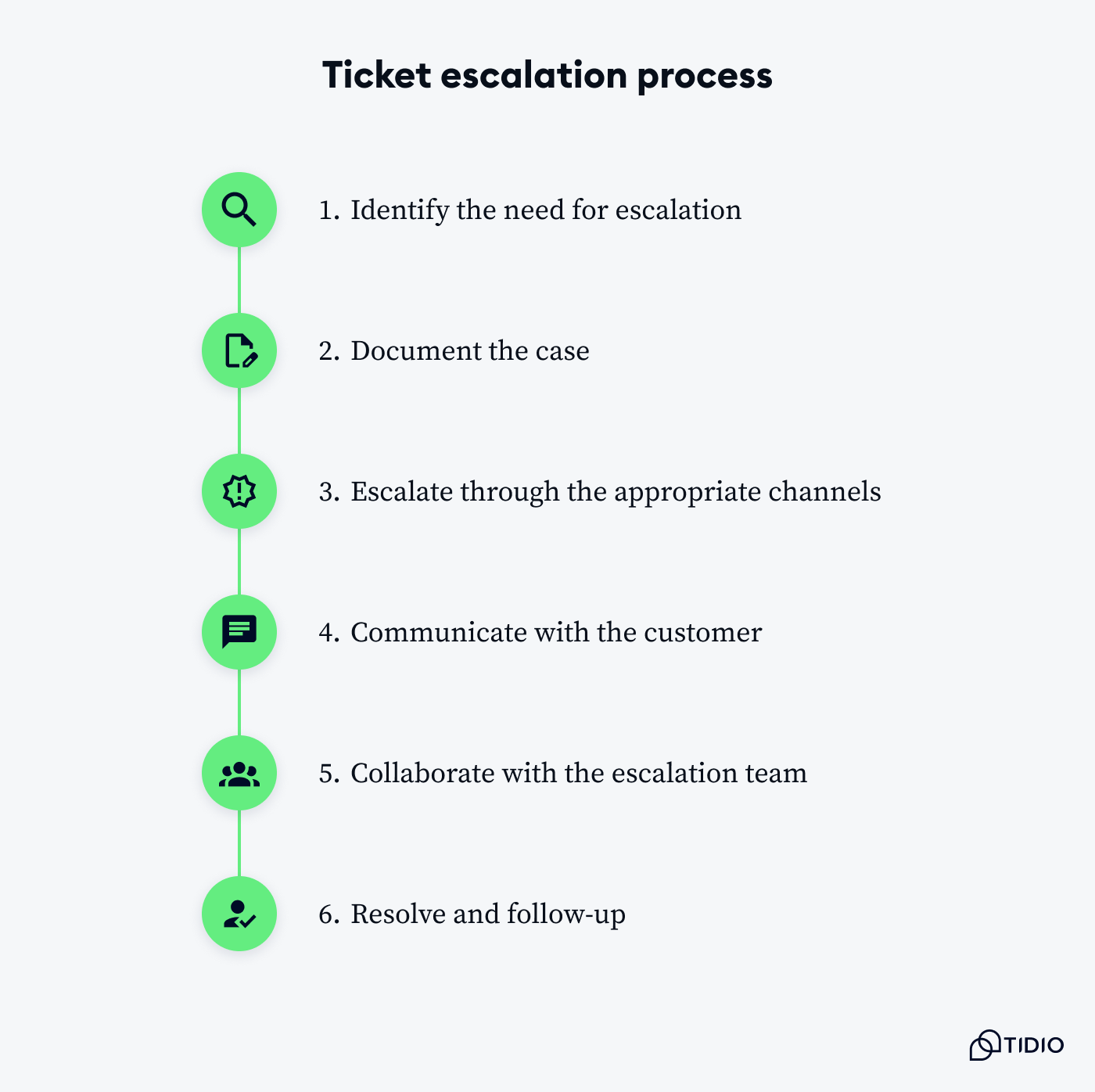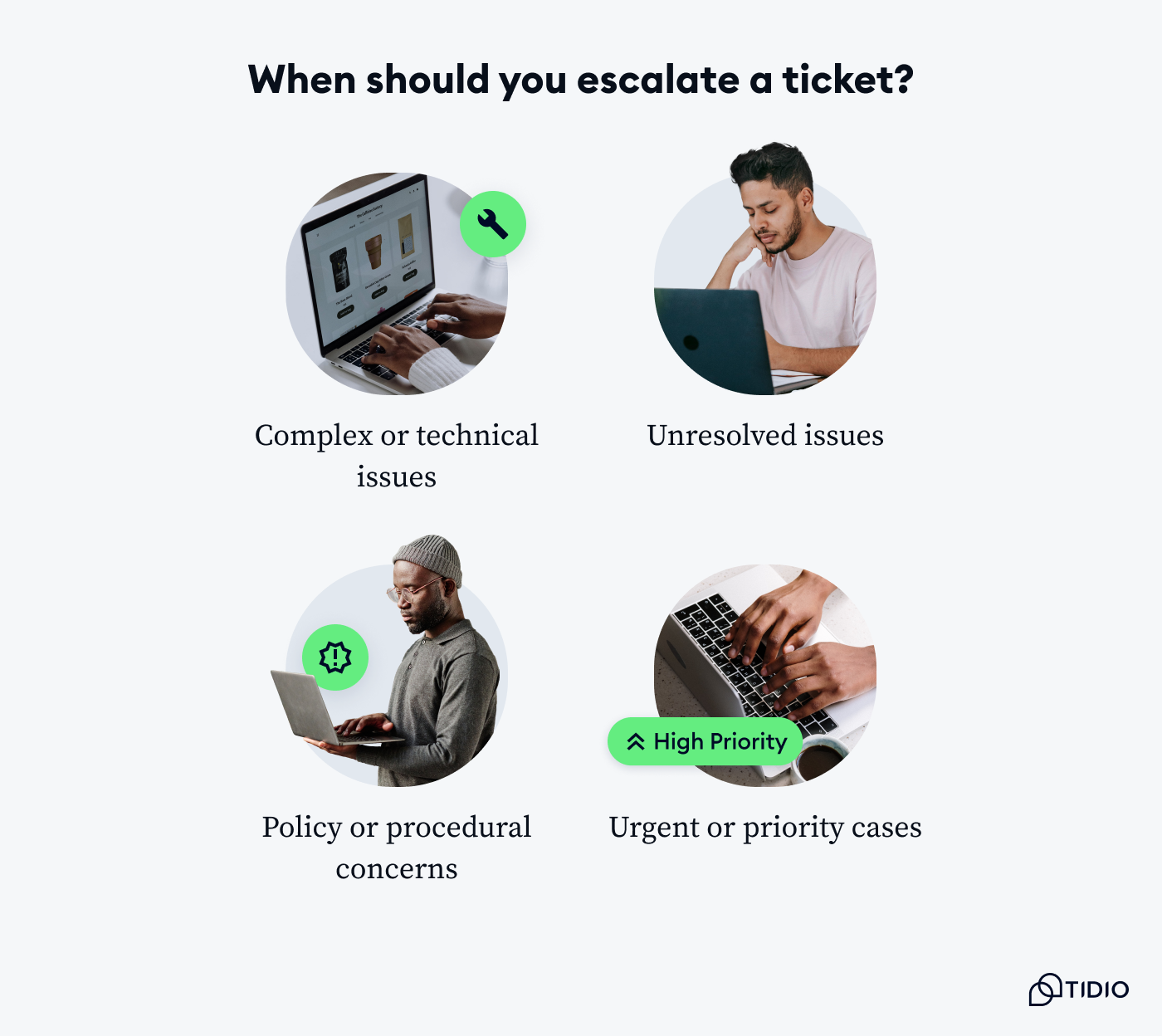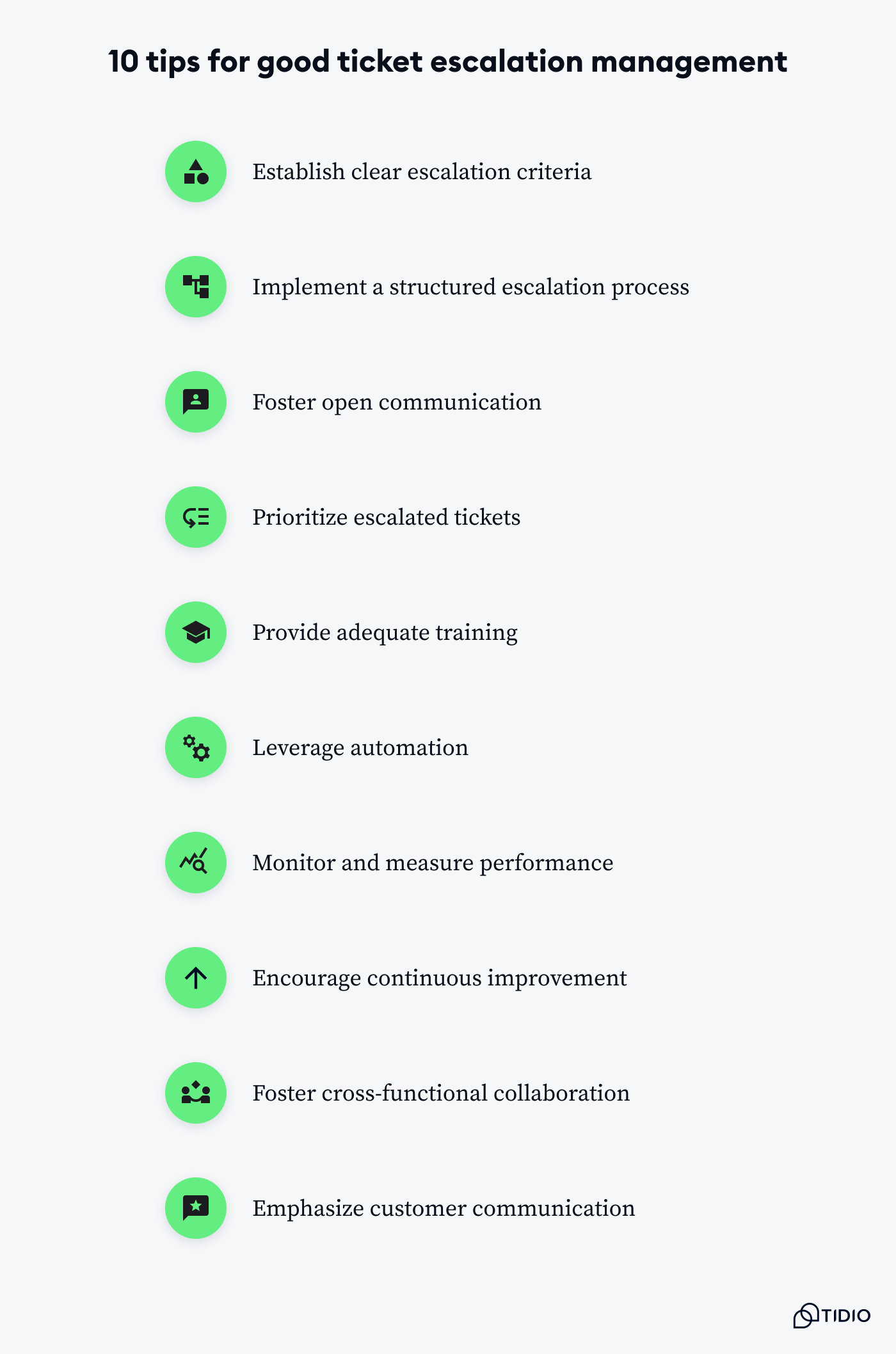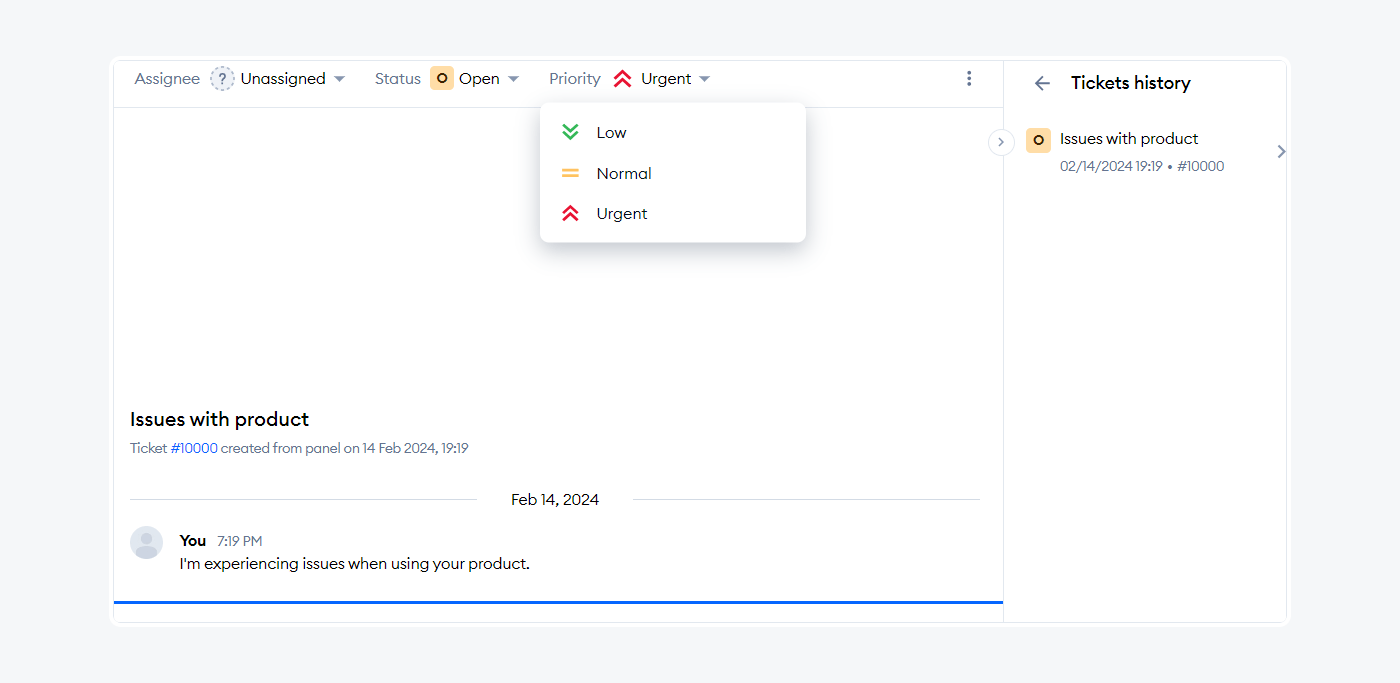As a customer service representative, you’re the first line of defense when clients encounter issues or have questions. While many inquiries can be resolved during the initial interaction, some cases require further assistance or specialized expertise.
This is where ticket escalation comes into play.
Ticket escalation is the act of transferring a customer’s case to a higher level of support or a specialized team within your organization. This process is typically initiated when the current support level lacks the knowledge, resources, or authority to resolve the issue effectively.
So, how to manage escalations?
Stick around to find out.
In this article:
- Ticket escalation stages
- When to escalate a ticket
- Tips for effective management
- Ready-to-use template
- Frequently asked questions
Automate ticket escalation using AI
If you want to find out more about effective customer service help desk, check out these articles:
- 9 Essential Help Desk Ticketing System Features
- 12-Step Help Desk Checklist for CX Excellence [Guide]
- What Is Help Desk Workflow? [Examples & Steps to Use]
Firstly, let’s get some background info—
What is the ticket escalation process?
Effective ticket escalation is crucial for maintaining customer satisfaction and fostering trust in your organization’s support capabilities. The process typically involves several stages to ensure that customer issues are addressed efficiently and by the appropriate personnel.
Here are the common stages of the customer service escalation process you should go through:

1. Identify the need for escalation
Recognize when a customer’s issue requires additional support or expertise beyond your current level. This includes evaluating the client’s issue and determining if this request can be solved at the current support level. If you think the question is outside of your expertise or permissions, escalate the issue. Otherwise, help the user to the best of your ability.
2. Document the case
Thoroughly document the customer’s issue, the steps you’ve taken to resolve it, and any relevant information that can assist the escalation agents in understanding the context. This can include classifying the ticket based on the organization’s criteria (e.g., severity, priority, category) and gathering all relevant information, additional resources, logs, as well as supporting materials.
3. Escalate through the appropriate channels
Follow your organization’s escalation procedures. These may involve notifying a supervisor, creating a new ticket with the appropriate agents, or transferring the case through your help desk ticketing system. Also, assign the ticket to the appropriate team member and provide a clear and concise summary of the issue alongside the escalation reason.
4. Communicate with the customer
Keep the client informed throughout the entire process. Explain the reason for the escalation, notify them about the next steps, and provide an estimated timeline for resolution. This will set expectations regarding response times and resolution timelines.
5. Collaborate with the escalation team
Be prepared to provide any additional information or context the escalation agent may require to resolve the customer’s issue effectively. And, if required, participate in knowledge transfer sessions or meetings and offer ongoing support and assistance.
6. Resolve and follow-up
Monitor the progress of the escalated ticket and ensure that you receive all the updates and resolution details from the escalation team. Once the support agents have resolved the issue, communicate the results to the customer and gather client feedback. Once you make sure they’re happy and satisfied with everything, close the ticket.
By following proper procedures and collaborating with specialized teams, you can ensure that even the most complex or challenging customer issues are addressed with the utmost professionalism and expertise.
Improve customer service with the best help desk system
You now know the process to follow. But when should you forward the client request to the higher-tier agents?
Let’s find out!
When should you escalate a ticket?
Escalating a ticket at the right time is crucial for effective customer support. By understanding when to escalate the ticket, you can ensure that customer issues are addressed promptly and effectively. This, in turn, will ultimately lead to improved customer retention and loyalty.
So, here are some common scenarios when ticket escalation is necessary:

Complex or technical issues
If a customer’s inquiry involves intricate technical details, specialized software, or advanced troubleshooting beyond your expertise, you should escalate the ticket. This will decrease the resolution time and boost your client’s satisfaction with the company. In fact, a recent report states that escalating complex issues to subject matter experts can reduce resolution times by up to 40%.
Unresolved issues
Despite your best efforts, if a customer’s issue remains unresolved after attempting multiple solutions, it’s time to escalate the ticket. Prolonged unresolved cases can lead to customer frustration with the brand. And about 65% of shoppers say they’re frustrated with unhelpful representatives, so ensure you hand over the client’s issue to a higher-level agent before that happens.
Policy or procedural concerns
Customers may raise questions, queries, or complaints related to your organization’s policies, procedures, or terms and conditions. While frontline customer service representatives can handle basic inquiries, more complex policy-related matters often require escalation to managers, legal teams, or dedicated policy specialists.
Urgent or priority cases
Some customer issues may be time-sensitive or have a significant impact on their business operations. In such cases, escalating the ticket ensures that the client’s query receives immediate attention and prioritization. In fact, about 75% of buyers think that a fast response time is the most important when it comes to digital customer experience, especially in urgent cases.
Frontline agents have to escalate customer support tickets in a good time frame to avoid frustration. Now you know when they should put the request forward to a higher level, so let’s check some best practices you can follow.
Tips for customer escalation management
The support ticket escalation process can sometimes be tricky for IT support reps. Knowing when to pass the request forward and the right hierarchical escalation, alongside making sure the client is happy, can be a lot to handle.
Here are 10 tips for good ticket escalation management you can use to ease this process:

1. Establish clear escalation criteria
Define specific criteria for when a customer request should be escalated. These benchmarks will ensure consistency and help representatives make informed decisions about escalation. These can include:
- Issue complexity
- Severity
- Customer impact
For example, if you have a software company, you may define escalation criteria based on issue severity, such as immediately escalating tickets related to system outages or data loss. At the same time, less critical bugs or feature requests can be handled through the regular support channels.
2. Implement a structured escalation process
Create a well-defined ticket escalation policy and a process that outlines the steps to be followed. A structured process streamlines the escalation workflow and prevents delays or confusion. The steps can include:
- Documentation requirements
- Escalation channels
- Communication protocols
Let’s say you have a retail company. Your customer escalation process could look something like:
The first level involves frontline support attempting to resolve the issue → If unresolved, the ticket is escalated to Level 2 with documentation and notes → Level 2 engages subject matter experts, higher-level support agents, or management as needed → Customer is kept informed throughout the process.
3. Foster open communication
Encourage open communication between customer support teams and escalation personnel. Regular meetings, knowledge-sharing sessions, and collaborative tools can facilitate effective knowledge transfer and ensure a seamless transition of escalated tickets.
For a financial services firm, this could mean holding weekly cross-team meetings. During these, customer support agents can discuss challenging cases with escalation teams, product experts, and developers, facilitating knowledge sharing and collaboration.
Read more: Discover how Wulff Beltton achieved 4.5-star client rating after switching to Tidio.
4. Prioritize escalated tickets
Implement a prioritization system that recognizes the urgency and importance of escalated tickets. Higher-priority tickets should receive immediate attention from the appropriate support escalation team, ensuring timely resolution of critical issues.

For example, a healthcare provider’s help desk software should automatically flag and assign high-priority tickets related to patient data privacy concerns or issues impacting critical medical systems. This will ensure the issues are addressed promptly by the appropriate teams.
Read more: Learn how to create custom ticket views in Tidio for easier prioritization of requests.
5. Provide adequate training
Invest in training programs for customer service representatives to enhance their technical knowledge, client communication skills, and understanding of escalation procedures. Well-trained staff can better identify when escalation is necessary and handle the process effectively.
If you have a telecommunications company, you should offer regular training sessions covering topics such as troubleshooting complex network issues, understanding escalation procedures, and effective communication techniques for handling escalated cases.
Read more: Check out the best customer service training ideas and resources you can use for your team.
6. Leverage automation
Explore automation tools and workflows to streamline the call center escalation process. Automating tasks such as ticket routing, notifications, and ticket status updates can improve efficiency and reduce manual effort. You can also implement customer self-service options for your customer queries like knowledge base and AI chatbots compliant with your service level agreements (SLA).
Let’s say you have an ecommerce company and your help desk system is integrated with the order management system. This will help to automatically escalate orders with shipping delays or issues to the logistics team, reducing manual effort and ensuring prompt attention.
Read more: Learn about automated ticket systems with detailed reviews of the best tools available on the market.
7. Monitor and measure performance
Establish key performance indicators (KPIs) to measure the effectiveness of your escalation management process and identify areas for improvement. Metrics you should track include:
- Resolution times
- Customer satisfaction score
- Escalation rates
- Net Promoter Score
For example, a SaaS company should track KPIs such as average resolution time, customer satisfaction scores, and the percentage of tickets requiring escalation. Using this data will help to identify bottlenecks and areas for process improvement.
Read more: Discover the key customer service metrics and helpdesk KPIs you should track in your business.
8. Encourage continuous improvement
Regularly review and analyze escalation data to identify patterns, bottlenecks, or areas for optimization. Implement feedback loops and encourage team members to suggest improvements to refine the escalation process.
Let’s take a manufacturing company as an example. This business should conduct quarterly review sessions. During these, support staff analyze escalation data, identify recurring issues or pain points, and propose process improvements or additional training needs based on their frontline experience.
9. Foster cross-functional collaboration
Promote collaboration between customer service teams, escalation teams, product managers, and developers. Cross-functional cooperation can lead to a better understanding of issues, more effective resolutions, and improved product or service quality.
As an example, an automotive company with dedicated escalation agents should include customer service agents, an engineer, legal representatives, and a product manager. This will allow for a holistic approach to resolving complex customer issues that may span multiple departments.
10. Emphasize customer communication
Prioritize clear and consistent communication with customers throughout the escalation process. Keep clients informed about the status of their issues, expected wait times, and any actions being taken to resolve their concerns, fostering transparency and trust.
Imagine you run a travel agency and want to ensure that customers with escalated tickets receive regular email or SMS updates on the status of their issue. These messages should include the steps being taken to resolve the query and any changes in expected resolution timelines. If established well, good communication stimulates transparency and manages customer expectations effectively.
By implementing these tips, organizations can establish an efficient ticket escalation management strategy. This includes ensuring that customer issues are addressed promptly, in a timely manner, and by the appropriate personnel, ultimately leading to improved customer satisfaction and loyalty.
Read more: Check out some tips for an effective help desk management you can implement in your organization.
Ticket escalation templates
We’ve prepared some templates to ensure that you say the right thing to the client when you escalate the ticket to a higher-tier frontline support. So, here are three ready-to-use ticket escalation templates that you can use:
Template 1: Initial escalation notification
| Subject: Escalation request – [Ticket #] – [Brief issue description] Dear [Escalation team/manager name], I am escalating the following ticket for further assistance: Ticket #: [Ticket number] Customer name: [Customer name] Brief issue description: [One-line summary of the issue] Reason for escalation: [Explain why the ticket needs to be escalated, e.g., complexity, required expertise, unresolved after multiple attempts, etc.] Steps taken so far: [List the steps you have already taken to resolve the issue, including any troubleshooting efforts, solutions attempted, and their outcomes.] Attachments/additional information: [List any relevant attachments, logs, screenshots, or additional context that may be helpful for the escalation team.] Customer communication: [Mention if you have already informed the customer about the escalation, or if they have requested the escalation themselves.] Please let me know if you need any additional information or assistance from my end. I appreciate your prompt attention to this matter. Best regards, [Your name] [Your role] [Company name] |
Template 2: Escalation update for customer
| Subject: Update on your support request [Ticket #] Dear [Customer name], Thank you for your patience and understanding regarding the issue you reported [brief description of the issue]. To ensure we provide you with the best possible resolution, we have escalated your case to our [specialized department name] for further assistance. The escalation team is now actively working on your case, and we anticipate providing you with an update within [expected timeline, e.g., 24-48 hours]. In the meantime, please feel free to reply to this email if you have any additional information or questions that may assist us in resolving your issue more efficiently. We understand the inconvenience this situation may have caused, and we appreciate your continued patience. Delivering excellent customer service is our top priority, and we are committed to finding a satisfactory resolution for you. Sincerely, [Your name] [Your role] [Company name] |
Template 3: Escalation handoff to specialized team
| Subject: Escalated ticket for assistance – [Ticket #] – [Brief issue description] Dear [Specialized department name], I am escalating the following ticket for your team’s expertise and assistance: Ticket #: [Ticket number] Customer name: [Customer name] Brief issue description: [One-line summary of the issue] Background and steps taken: [Provide context and details about the issue, including any troubleshooting efforts, solutions attempted, and their outcomes.] Reason for escalation: [Explain why the ticket needs to be escalated to this specific team, e.g., required expertise, product/service knowledge, authorization level, etc.] Customer communication: [Mention if the customer has been informed about the escalation and any expectations set regarding resolution timelines.] Attachments/additional information: [List any relevant attachments, logs, screenshots, or additional context that may be helpful for the team.] Please let me know if you need any further information or assistance from my end. I appreciate your prompt attention to this matter and look forward to a successful resolution for our customer. Best regards, [Your name] [Your role] [Company name] |
Read more: Check out some useful help desk templates you can copy-paste for quicker replies.
Ticket escalation: key takeaway
Effective ticket escalation is a critical component of delivering exceptional customer service. Some scenarios where escalation becomes necessary include complex technical issues, unresolved problems, policy or procedural concerns, and urgent or high-priority cases.
By recognizing these situations promptly, organizations can ensure customer issues are addressed by the appropriate staff with the required expertise.
Let’s quickly review some of the tips for effective ticket escalation management:
- Establishing clear escalation criteria
- Implementing a well-defined escalation process
- Fostering open communication and knowledge sharing between support and escalation teams
- Prioritizing escalated tickets based on urgency and importance
- Providing adequate training to customer service staff on escalation procedures
- Leveraging automation tools to streamline the escalation workflow
- Monitoring and measuring KPIs related to escalation performance
- Encouraging continuous improvement by analyzing escalation data and feedback
- Promoting cross-functional collaboration between teams for holistic issue resolution
- Ensuring transparent and consistent communication with customers throughout the process
And remember—effective escalation management is an ongoing process that requires continuous refinement and adaptation to evolving customer needs and organizational changes.
Consistently prioritizing and improving escalation practices will position your organization as a leader in delivering exceptional customer experiences. A help desk with advanced ticketing prioritization can help you with that. Tidio is one of the best players on the market in that category.
Why not give it a try?
Try the best ticket escalation software on the market
Frequently Asked Questions
An escalation process in customer service directs a customer’s inquiry to a higher-level department within the organization. This happens when the issue is too complex, requires specific permissions to be resolved, or has a high-priority problem.
To escalate the ticket, you should follow these steps:
1. Identify the need for escalation
2. Document the case
3. Escalate through appropriate channels
4. Communicate with the customer
5. Collaborate with the escalation team
6. Follow up on the resolution
No, escalation is not a complaint. It ensures the fastest and most efficient resolution of the customer’s inquiry.

